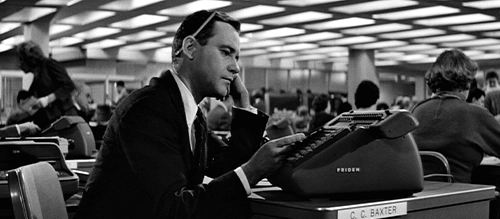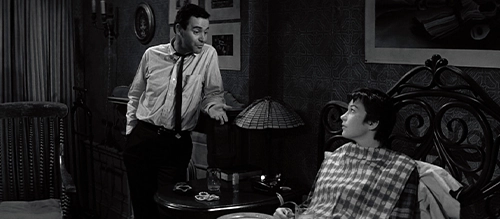The Apartment: The Elevator Between Eras
Winner of the Academy Award for Best Picture in 1961 and ranking number 54 on the British Film Institute’s Sight & Sound poll for best films of all time, The Apartment has never gone under the radar nor been forgotten in the six decades and change since its release. Coming right off the controversial comedic success of Some Like It Hot the previous year, featuring a cross-dressing Jack Lemmon opposite Marilyn Monroe, director Billy Wilder and frequent collaborator I.A.L. Diamond showed a new, more dramatic (but still lively and laugh-out-loud-worthy) side to stars Lemmon, Shirley MacLaine, and Fred MacMurray. While more complicated than just being what is often referred to as the final nail in the coffin of the Hays Code, Some Like It Hot fed audiences a heaping taste of the real world and all its moral complexity on a platter of laughs. The Apartment, then, is just as uproarious in a more contemplative way, through the eyes of the great everyman, C.C. “Bud” Baxter.
Baxter works in the Ordinary Policy Department at an insurance company with more employees working in their headquarters than a city of more than 30,000 in Mississippi. He tells us about his average day and strange predicament by way of the Classical Hollywood introductory voiceover narration that doesn’t reappear after the opening sequence. The year is 1959 and Baxter has worked at his company for just shy of four years, but he has already worked his way up to the 19th floor through a lucrative favor he offers executives: use of his apartment to discreetly spend time with their mistresses.
The film is a rousing dramatic romantic comedy, but its context is just as interesting as its content.

The Apartment was released at the beginning of the 1960s, and the end of an era. Movie theaters and movies themselves had once ruled entertainment, but the Golden Age of Hollywood was slipping away with the end of the decade of expanding suburbia and post-war excess. In an early scene, Baxter sits in front of the television with his TV dinner in tow and is excited to watch Grand Hotel (1932) on the tiny screen; a minor commentary on his own hotel-like home-life, and also an indictment of commercialization. The film and its stars are announced, but it won’t be played until after an advertisement. Grand Hotel is announced in all its glory again, but not before another commercial. Baxter does what many viewers have done and turns off the TV in frustration. There is no escape from capitalism and the race to make more money, least of all at the home that lets him move up the corporate ladder. In this rat race, it feels like the old world is dead and the only way forward is up.
Baxter grows more disillusioned and more disgusted with himself and the men he is catering to and finally gets fed up and leaves the coveted 27th floor all together. Shirley MacLaine’s lively and emotionally complex elevator operator Fran Kubelik comes to her senses around the same time Baxter does, and the two reunite and ring in the new year together.
The film ends at the beginning of 1960, the end of Old Hollywood and the beginning of the New Hollywood cinema movement. In the coming years, most of the blacks and whites were traded for color; Hays Code rules were flaunted until finally they were thrown out and replaced with the MPAA rating system; a new, freer American cinema was born. Films such as Bonnie and Clyde, The Graduate, In the Heat of the Night, Rosemary’s Baby, and Midnight Cowboy eschewed classical Hollywood storytelling and embraced independent financing as movie profits declined and television was growing in popularity.

Just a decade before The Apartment, Wilder also won Best Picture for his 1950 film Sunset Boulevard, about an aspiring screenwriter and a fading silent film star who is unable to cope with a changing world and Hollywood. In both films, the protagonists feel trapped — whether in a grand mansion or in a Kafkaesque office. Yet, perhaps because of mid-century corporate milieu and not in spite of it, The Apartment endures. It captures the desperation for more, and the dissatisfaction when one gets it. Sometimes what we need is not a longer elevator ride all the way to the top floor, but the companionship of people who see us at our lowest, and stay.
The Apartment was famously described as “a dirty fairy tale” by The Saturday Review’s Hollis Alpert. There is some truth to that, in its influence on later romantic comedies, with its ending of Fran running across New York City on New Year’s Eve to see Baxter again. Jack Lemmon once described the film and its ambiguous protagonist succinctly, saying it is about the “misuse of the American Dream.” It is both, and more. The Apartment is reckoning with the recent past and dreams of corporate grandeur, and coming together in the classic way we have on New Year’s Eves for decades, on screen (such as in It’s a Wonderful Life and in When Harry Met Sally, which mirrors The Apartment’s ending, with Billy Crystal’s character also running across New York City to reconcile with Meg Ryan’s) and in real-life: to the tune of “Auld Lang Syne” and ushering in the new, with all of its uncertainty.
By Kyra Lieberman
You can support Kyra Lieberman in the following places:
Portfolio: Kyra Lieberman
Blog: & More
X (Twitter): @kyralieberman
Instagram: @kyralieb

